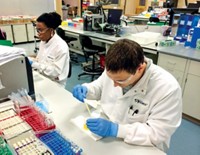Advertisement
Grab your lab coat. Let's get started
Welcome!
Welcome!
Create an account below to get 6 C&EN articles per month, receive newsletters and more - all free.
It seems this is your first time logging in online. Please enter the following information to continue.
As an ACS member you automatically get access to this site. All we need is few more details to create your reading experience.
Not you? Sign in with a different account.
Not you? Sign in with a different account.
ERROR 1
ERROR 1
ERROR 2
ERROR 2
ERROR 2
ERROR 2
ERROR 2
Password and Confirm password must match.
If you have an ACS member number, please enter it here so we can link this account to your membership. (optional)
ERROR 2
ACS values your privacy. By submitting your information, you are gaining access to C&EN and subscribing to our weekly newsletter. We use the information you provide to make your reading experience better, and we will never sell your data to third party members.
Careers
Seeking Analytical Chemists
Industry’s demand for analytical chemists is growing, but some worry whether the academic pipeline can keep pace
by Linda Wang
March 30, 2015
| A version of this story appeared in
Volume 93, Issue 13

The economic recession of 2008 hit many areas of the chemical sector hard, spurring widespread layoffs and leaving behind a lackluster job market for chemists in the years since. But the field of analytical chemistry seems to have weathered the storm much better than others.
“Analytical has always been easier than other areas of chemistry to get positions,” says Susan Olesik, Dow Professor of Chemistry at Ohio State University. “Even through the recession, we were able to get our students placed. It took longer, but they still got placed.”
Help For The Unemployed
Many chemists are still struggling to find jobs. ACS offers an extensive suite of career assistance tools and discounts. For links to the career-related benefits and resources for members, visit www.acs.org/unemployed.
Trained as problem solvers, analytical chemists play a critical role in many industries, from pharmaceutical testing to food safety to environmental analysis. And analytical chemists with interdisciplinary backgrounds are finding an even greater demand for their skills by employers. The demand is so great that some experts worry whether academia can produce enough analytical chemists to keep pace with industry’s growing needs.
Analytical chemistry is a popular specialty among chemists. According to the 2014 American Chemical Society salary and employment survey, among 20 work specialties, analytical chemistry employed the highest percentage of ACS members, at 14%. Organic chemistry was next at 11% of members. In fact, analytical chemistry has been the top work specialty among ACS members for more than a decade.
“It’s a great time to be an analytical chemist,” says Dan Shine, president of chromatography and mass spectrometry at Thermo Fisher Scientific. The company employs roughly 4,600 scientists and engineers, including analytical chemists. “We typically have hundreds of positions open at any one time,” he says.
Mary Ellen McNally, Technical Fellow at DuPont, says hiring of analytical chemists at DuPont has been on the rise, but finding qualified candidates remains a challenge. “We have closed out searches and started over because we are looking for highly qualified candidates,” she says.
One of the reasons behind the growth of analytical chemistry jobs is that industry is recognizing the value that analytical chemists bring to solving challenging problems, says Xiaoli Wang, an R&D manager in the CrossLab Group at Agilent Technologies. In the past, he notes, “analytical chemistry was viewed as a more applied science as opposed to a fundamental science.”
Stephen Scypinski, vice president of analytical and bioanalytical development at Bristol-Myers Squibb, agrees. “Analytical chemistry used to be known as a service discipline, but now it’s an integral part of the development organization,” he says. “The evolution of analytical chemistry has gone from, ‘Run this sample for me,’ to, ‘Help me get the requisite knowledge to make the next decision in advancing a product to commercialization.’ ”
Another reason the demand for analytical chemists is growing is that analytical instruments are becoming more powerful. “We’re generating tons of information, but how we make sense of that information is critically important as well,” says Thermo Fisher’s Shine. “Both of those factors open up more applications, which opens up more jobs.”
Meanwhile, industry is demanding more from analytical chemists. In some sectors, such as the pharmaceutical industry, there’s a growing need for analytical chemists with a strong interdisciplinary background. At Merck & Co., for example, analytical chemists who have training in synthetic and organic chemistry are especially sought after, says Zhihong Ge, head of analytical chemistry in the process and analytical chemistry department at Merck.
“We’re looking for candidates with a really strong fundamental understanding of the core chemistry principles in analytical and organic chemistry,” Ge says. “Because of the relatively recent broadening of our R&D focus to include both small molecules and large molecules, we are asked to solve problems with greater complexity, and we have to do the job faster and be more productive. All that drives our need for people coming in ready to be at the top of their game and at the forefront of change.”
Currently, she says, to get the right blend of skills, Merck often either brings in someone who has been trained in organic chemistry and teaches them analytical chemistry, or brings in someone who has been trained in analytical chemistry and teaches them organic chemistry.
Ian Mangion, for instance, started at Merck as a synthetic organic chemist, but he found himself becoming more and more interested in the analytical side of things. “There’s a synergy between making and measuring, and learning the other part of the equation became interesting to me,” he says. “A lot of the training I’ve gotten has been on the job, being mentored by senior people in the department, learning a new skill set, and broadening myself as a pharmaceutical scientist.
“I’m supporting development projects in much the same way I was doing as a synthetic chemist, only now I’m looking through the other end of the telescope,” he says. “Whereas before I was working on improving the synthesis of a compound, now I’m thinking about ‘How do we understand and control the impurity profile of this compound?’ ”
As for the analytical chemists in the department, they are getting on-the-job training as well. “A lot of the focus with new employees here at Merck is exposing analytical chemists to the organic chemistry and involving us in the meetings and the discussions so that we can be familiar with what’s happening,” says Ben Mann, a senior scientist in the company’s process and analytical chemistry department.
“As an analytical chemist, one of the key skills is problem solving, but your ability to solve a problem is often contingent on how well you understand that problem. Having a better understanding of, for example, reaction mechanisms, gives one the opportunity to come up with better solutions for a given pharmaceutical problem,” he says.
Ge says that although this type of training helps produce the type of chemists Merck needs, she hopes that more of this interdisciplinary training can be done at the university level.
One of the issues academia is facing is the relatively limited pipeline of analytical chemistry graduates. “In academia, we suffer still from this historical disconnect when analytical chemistry was not regarded as one of the key disciplines in the chemical sciences,” says Milos Novotny, Distinguished Professor Emeritus and Lilly Chemistry Alumni Chair at Indiana University, Bloomington.
He points out that in the 1960s, some universities de-emphasized their analytical chemistry programs and focused instead on other disciplines that were growing at the time, such as synthetic chemistry. Today, some of the strongest graduate programs in analytical chemistry are at large public institutions, primarily in the Midwest.
Many midwestern schools are land-grant institutions, supported by state funding, notes Peter T. Kissinger, professor of analytical chemistry at Purdue University. “These states wanted the universities to play a role in advancing their economies,” he says. “That favors engineering, agriculture, chemistry, and industrial chemistry, which back then included analytical chemistry.”
Some analytical chemists worry whether academia can produce enough new faculty to train the next generation of analytical chemists. Ohio State’s Olesik says that of the more than 50 graduate students she has trained, every single one has gone into industry. “The difference in salaries between academic and industrial analytical chemists is significant,” she says.
“I think academic analytical chemistry has to be really careful or we won’t have enough graduates to support industry’s needs,” Olesik says. “This dwindling away of the academic analytical enterprise, it’s not a good thing, but it’s real.” She encourages analytical chemists to consider careers in academia as well as industry. “The field of academic analytical chemistry continues to be an exciting one with numerous intellectual rewards,” she notes.
Analytical chemistry has proven to be a resilient field, she says, and its future is bright. “We have always weathered things better than any of the rest of the chemical disciplines,” Olesik says.





Join the conversation
Contact the reporter
Submit a Letter to the Editor for publication
Engage with us on Twitter